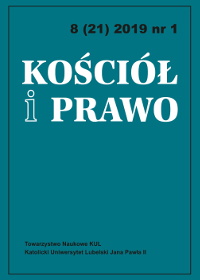Obostrzenie wymiaru kary w prawie kanonicznym oraz polskim prawie karnym
Abstrakt
Ustawodawca kościelny w kan. 1326 § 1 i 2 KPK/83 zawarł okoliczności, które wprawdzie fakultatywnie, ale jednak mogą skutkować surowszym ukaraniem przestępcy. Uregulowania, przewidujące obostrzenie wymiaru kary przewidział również ustawodawca świecki w art. 64 § 1 i 2, art. 65 § 1, art. 57a § 1 i 2 oraz art. 91 § 1, 2 i 3 Kodeksu karnego. Systemy te nie funkcjonują jednak w próżni. Odnoszą się do konkretnych podmiotów, które są jednocześnie wiernymi Kościoła katolickiego i obywatelami Rzeczypospolitej Polskiej. Niniejszy artykuł ma na celu scharakteryzowanie instytucji obostrzających wymiar kary oraz wskazanie podobieństw i różnic pomiędzy tymi systemami. Prawo kanoniczne i świeckie zawierają systematyczne uregulowania podobne dla nich obu (jak ma to miejsce w przypadku recydywy), jak i je różniące, których jest więcej. Głównym powodem takiego stanu rzeczy jest to, że prawo karne jest prawem o wysokim stopniu abstrakcji, bowiem jest skierowane do wszystkich obywateli Rzeczypospolitej Polskiej, a także osób przebywających na jej terenie. Jego celem jest ukaranie sprawcy w sposób zgodny z oczekiwaniami społeczeństwa oraz prewencja generalna i ogólna. W przypadku prawa kanonicznego odnosi się ono do konkretnych podmiotów będących wiernymi Kościoła katolickiego. Ponadto kieruje się ono zasadą miłosierdzia kościelnego wymiaru kary zawartą w kan. 1349 KPK/83.
Bibliografia
Arias, Juan. 2011. „Komentarz do kan. 1326.” W Codex Iuris Canonici. Kodeks Prawa Kanonicznego. Komentarz. Powszechne i partykularne ustawodawstwo Kościoła katolickiego. Podstawowe akty polskiego prawa wyznaniowego. Edycja polska na podstawie wydania hiszpańskiego, red. Piotr Majer, 997-998. Kraków: Wolters Kluwer Polska.
Bojarski, Marek, red. 2017. Prawo karne materialne. Część ogólna i szczególna. Warszawa: Wolters Kluwer Polska.
Bojarski, Tadeusz, red. 2013. Kodeks karny. Komentarz. Warszawa: LexisNexis.
Filar, Marian, red. 2012. Kodeks karny. Komentarz. Warszawa: LexisNexis.
Gajda, Piotr M. 2008. Sankcje karne w Kościele w świetle Kodeksu Prawa Kanonicznego Jana Pawła II oraz późniejszych zmian i uzupełnień. Tarnów: Wydawnictwo Diecezji Tarnowskiej Biblos.
Giezek, Jacek, red. 2012. Kodeks karny. Część ogólna. Komentarz. Warszawa: Wolters Kluwer Polska.
Grześkowiak, Alicja, i Krzysztof Wiak, red. 2017. Kodeks karny. Komentarz. Warszawa: Wydawnictwo C.H. Beck.
Konarska-Wrzosek, Violetta, red. 2016. Kodeks karny. Komentarz. Warszawa: Wolters Kluwer Polska.
Królikowski, Michał, i Robert Zawłocki, red. 2010. Kodeks karny. Część ogólna. Tom II. Komentarz. Art. 32-116. Warszawa: Wydawnictwo C.H. Beck.
Mozgawa, Marek, red. 2013. Kodeks karny. Komentarz. Warszawa: Wolters Kluwer Polska.
Renken, John A. 2015. The Penal Law of the Roman Catholic Church. Commentary on Canons 1311-1399 and 1717-1731 and Other Sources of Penal Law. Ottawa: Saint Paul University.
Syryjczyk, Jerzy. 2005. „Powrót do przestępstwa w ujęciu prawa kanonicznego.” Prawo Kanoniczne 48, nr 3-4:151-74.
Syryjczyk, Jerzy. 2008. Sankcje w Kościele. Część ogólna. Komentarz. Warszawa: Wydawnictwo UKSW.
Wójcik, Walenty, Józef Krukowski, i Florian Lempa. 1987. Komentarz Prawa Kanonicznego z 1983 r. Księga V. Dobra doczesne Kościoła. Księga VI. Sankcje w Kościele. T. 4. Lublin: Redakcja Wydawnictw KUL.
Zoll, Andrzej, red. 2012. Kodeks karny. Część ogólna. Tom I. Komentarz do art. 1-116 k.k. Warszawa: Wolters Kluwer Polska.
Copyright (c) 2019 Kościół i Prawo

Utwór dostępny jest na licencji Creative Commons Uznanie autorstwa – Użycie niekomercyjne – Bez utworów zależnych 4.0 Międzynarodowe.





